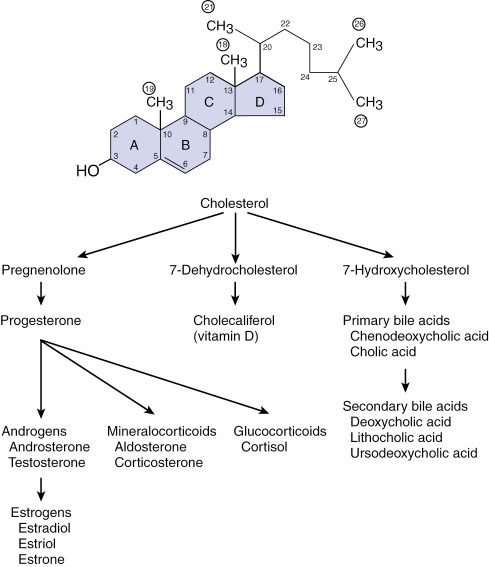5-Cholesten-3β-ol (cholestane with a 5,6 double bond and a 3β-hydroxyl group); the most abundant steroid in animal tissues, especially in bile and gallstones, and present in food, especially food rich in animal fats; circulates in the plasma complexed to proteins of various densities and plays an important role in the pathogenesis of atheroma formation in arteries. SEE ALSO: lipoprotein.
* * *
cho·les·ter·ol kə-'les-tə-.rōl, -.rȯl n a steroid alcohol C27H45OH present in animal cells and body fluids that regulates membrane fluidity, functions as a precursor molecule in various metabolic pathways, and as a constituent of LDL may cause arteriosclerosis
* * *
n.
a fatlike material (a sterol) present in the blood and most tissues, especially nervous tissue. Cholesterol and its esters are important constituents of cell membranes and are precursors of many steroid hormones and bile salts. Western dietary intake is approximately 500-1000 mg/day. Cholesterol is synthesized in the body from acetate, mainly in the liver, and blood concentration is normally 140-300 mg/100 ml (3.6-7.8 mmol/l).
An elevated concentration of cholesterol in the blood (hypercholesterolaemia) is often associated with atheroma, of which cholesterol is a major component. Hypercholesterolaemia and the resulting atheroma have been linked with a high dietary intake of saturated fats and cholesterol. However, current thinking suggests that the damage to blood vessels is actually caused by high levels (over 4.4 mmol/l) of low-density lipoprotein (LDL), one of the forms in which cholesterol is transported in the bloodstream, in its oxidized form. Therefore increasing the dietary intake of antioxidant would appear to protect against atherosclerosis. People with primary (or familial) hypercholesterolaemia have a genetic defect causing a lack of LDL receptors, which remove cholesterol from the bloodstream. Drugs are available that lower serum cholesterol and LDL levels. Cholesterol is also a constituent of gallstone.
* * *
cho·les·ter·ol (kə-lesґtər-ol″) [chole- + sterol] a eukaryotic sterol that in higher animals is the precursor of bile acids and steroid hormones and a key constituent of cell membranes, mediating their fluidity and permeability. Most is synthesized by the liver and other tissues, but some is absorbed from dietary sources, with each kind transported in plasma by specific lipoproteins. Cholesterol can accumulate or deposit abnormally, as in some gallstones and in atheromas. [NF] a preparation of cholesterol used as an emulsifying agent in pharmaceuticals.
 Structure and metabolism of cholesterol.
Structure and metabolism of cholesterol.
Medical dictionary. 2011.